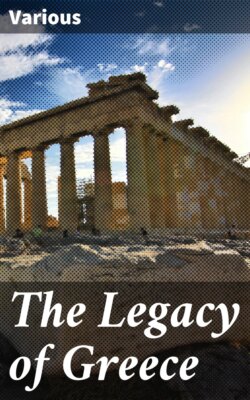The Legacy of Greece

Реклама. ООО «ЛитРес», ИНН: 7719571260.
Оглавление
Various. The Legacy of Greece
The Legacy of Greece
Table of Contents
THE VALUE OF GREECE TO THE FUTURE OF THE WORLD
RELIGION
PHILOSOPHY
MATHEMATICS AND ASTRONOMY
NATURAL SCIENCE
Aristotle
BIOLOGY
Before Aristotle
After Aristotle
MEDICINE
LITERATURE
HISTORY
I. The Relationship between Ancient Greek and Modern Western Civilization
II. Ancient Greek Civilization as a Work of Art
III. The Plot of Ancient Greek Civilization
IV. The Literary Expression of the Plot
POLITICAL THOUGHT
THE LAMPS OF GREEK ART
I
II
III
IV
V
VI
VII
VIII
IX
X
ARCHITECTURE
FOOTNOTES:
Отрывок из книги
Published by Good Press, 2019
.....
In the first place, it does not mean that Greek art is what we call ‘naturalist’ or ‘realist’. It is markedly the reverse. Art to the Greek is always a form of Sophia, or Wisdom, a Technê with rules that have to be learnt. Its air of utter simplicity is deceptive. The pillar that looks merely straight is really a thing of subtle curves. The funeral bas-relief that seems to represent in the simplest possible manner a woman saying good-bye to her child is arranged, plane behind plane, with the most delicate skill and sometimes with deliberate falsification of perspective. There is always some convention, some idealization, some touch of the light that never was on sea or land. Yet all the time, I think, Greek art remains in a remarkable degree close to nature. The artist’s eye is always on the object, and, though he represents it in his own style, that style is always normal and temperate, free from affectation, free from exaggeration or morbidity and, in the earlier periods, free from conventionality. It is art without doubt; but it is natural and normal art, such as grew spontaneously when mankind first tried in freedom to express beauty. For example, the language of Greek poetry is markedly different from that of prose, and there are even clear differences of language between different styles of poetry. And further, the poetry is very seldom about the present. It is about the past, and that an ideal past. What we have to notice there is that this kind of rule, which has been usual in all great ages of poetry, is apparently not an artificial or arbitrary thing but a tendency that grew up naturally with the first great expressions of poetical feeling.
Furthermore, this closeness to nature, this absence of a unifying or hide-bound system of thought, acting together with other causes, has led to the extraordinary variety and many-sidedness which is one of the most puzzling charms of Ancient Greece as contrasted, say, with Israel or Assyria or early Rome. Geographically it is a small country with a highly indented coast-line and an interior cut into a great number of almost isolated valleys. Politically it was a confused unity made up of numerous independent states, one walled city of a few thousand inhabitants being quite enough to form a state. And the citizens of these states were, each of them, rather excessively capable of forming opinions of their own and fighting for them. Hence came in practice much isolation and faction and general weakness, to the detriment of the Greeks themselves; but the same cause led in thought and literature to immense variety and vitality, to the great gain of us who study the Greeks afterwards. There is hardly any type of thought or style of writing which cannot be paralleled in ancient Greece, only they will there be seen, as it were, in their earlier and simpler forms. Traces of all the things that seem most un-Greek can be found somewhere in Greek literature: voluptuousness, asceticism, the worship of knowledge, the contempt for knowledge, atheism, pietism, the religion of serving the world and the religion of turning away from the world: all these and almost all other points of view one can think of are represented somewhere in the records of that one small people. And there is hardly any single generalization in this chapter which the author himself could not controvert by examples to the contrary. You feel in general a great absence of all fetters: the human mind free, rather inexperienced, intensely interested in life and full of hope, trying in every direction for that excellence which the Greeks called aretê, and guided by some peculiar instinct toward Temperance and Beauty.
.....